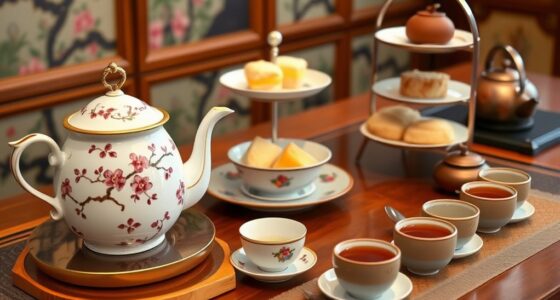Rooibos means "red bush" in Afrikaans and refers to a distinctive, caffeine-free herbal tea made from the Aspalathus linearis plant, native to South Africa. The name reflects its unique reddish-brown color, derived from the full oxidation process of the leaves. There are two main types: red rooibos, which has a rich flavor, and green rooibos, known for its lighter taste and higher antioxidants. Rooibos tea is not only a beloved beverage but also a symbol of hospitality in South African culture. If you're curious about its health benefits or how it's produced, there's much more to discover.
Key Takeaways
- "Rooibos" is derived from the Afrikaans term "rooibosch," meaning "red bush," referring to its native plant.
- The word "rooi" translates to "red," indicating the tea's characteristic color.
- "Bos" means "bush" or "shrub," highlighting the plant's botanical nature.
- Rooibos is an herbal tea made from Aspalathus linearis, native to South Africa.
- It holds cultural significance in South Africa, symbolizing hospitality, especially among the Khoisan people.
Definition of Rooibos

Rooibos, often called "red bush," is a unique herbal tea made from the leaves of the Aspalathus linearis plant, native to western South Africa.
This tea stands out among traditional options because it's derived from a different plant species and is naturally caffeine-free. The oxidation process of the leaves gives you two main varieties: red rooibos, fully oxidized with a rich flavor, and green rooibos, which retains a lighter taste due to minimal oxidation.
Rooibos is celebrated for its health benefits, packed with antioxidants that can boost your wellness.
With its aromatic, slightly sweet flavor, rooibos has become a favorite among those seeking a soothing beverage that supports a healthy lifestyle.
Etymology and Word History
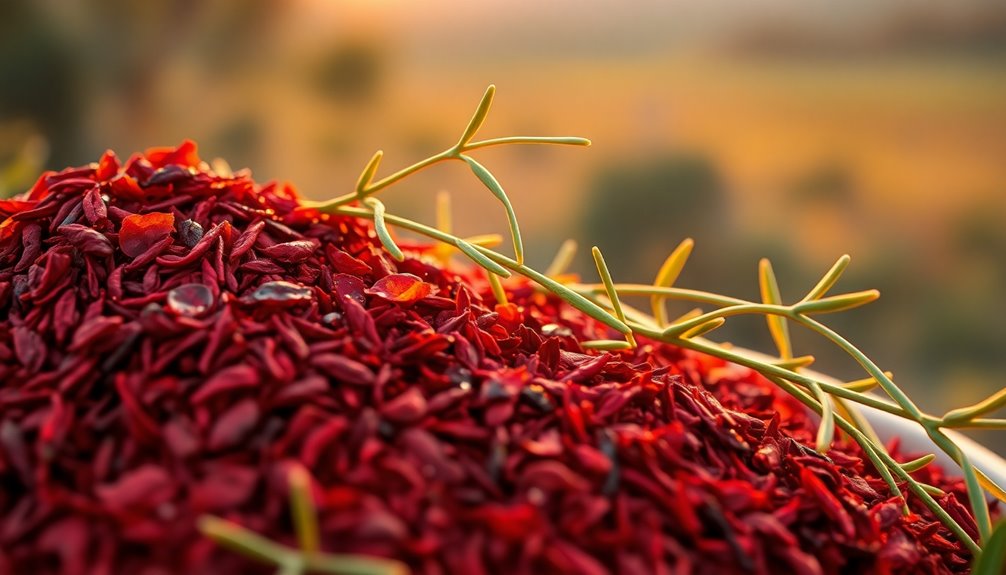
The term "rooibos" comes from the Afrikaans word "rooibosch," meaning "red bush," which perfectly captures the tea's rich color.
You’ll notice how the phonetic evolution of “rooi” reflects its Dutch origins, connecting you to the history of the language in South Africa. This connection to Dutch not only highlights the cultural exchange but also enriches our understanding of the local dialects. For those curious about the complexities of this language evolution, learning how to pronounce rooibos can serve as a delightful entry point into the rich tapestry of South African linguistic heritage. As you explore the pronunciation, you’ll uncover the shared history and unique adaptations that make the language so intriguing.
Plus, the straightforward translation to "rooibostee" shows just how embedded this tea is in local culture.
Afrikaans Origin Explained
Originating from the Afrikaans word "rooibosch," the term "rooibos" literally means "red bush," a nod to the distinctive reddish-brown hue of the tea it represents.
The word combines "rooi," meaning "red," which comes from the Dutch "rode," tracing back to Middle Dutch "rood." The second part, "bos," means "forest, bush, or shrub" and has roots in Middle Dutch "bosch."
This linguistic connection highlights the influence of Dutch on Afrikaans, showcasing how colonial languages shaped the region's cultural identity.
When you refer to rooibos tea as "rooibostee" in Afrikaans, you're directly linking it to its rich cultural and linguistic heritage, reflecting the deep roots of this beloved beverage in South African history.
Phonetic Evolution Details
As you explore the phonetic evolution of "rooibos," you'll notice how language shifts often reveal deeper cultural connections.
Originating from the Afrikaans word "rooibosch," meaning "red bush," this term reflects both its color and heritage. Here are some key points about its evolution:
- Rooi: Derived from the Dutch "rode," showing continuity in sound.
- Bos: Evolving from Middle Dutch "bosch," it now encompasses various vegetation types.
- Linguistic Shift: Afrikaans retains some Dutch phonetics, highlighting change over time.
- Cultural Influences: The term illustrates a blend of indigenous and colonial histories in South Africa.
This phonetic evolution of "rooibos" serves as a demonstration to the rich tapestry of language and culture in the region.
Translation to Other Languages
Exploring the translation of "rooibos" into other languages reveals how this unique term has spread beyond its Afrikaans roots. The word "rooibosch," meaning "red bush," reflects the plant's reddish hue after oxidation.
In Afrikaans, "rooi" translates to "red," derived from the Dutch "rode," while "bos" means "bush" or "shrub." This evolution highlights the cultural significance of rooibos in South Africa, where it's cherished as an herbal tea.
The straightforward translation to "rooibostee" in Afrikaans emphasizes its popularity. Other languages have adopted the term, making rooibos a global symbol of health benefits and unique flavor.
As you explore these translations, you'll appreciate how rooibos transcends linguistic barriers and connects cultures through its rich heritage.
Cultural Importance of Rooibos

Rooibos tea holds a special place in South African culture, with roots in the traditions of the Khoisan people who valued it for its health benefits.
As you've likely noticed, its popularity has surged globally, making it a go-to choice for those seeking caffeine-free options.
You'll find that rooibos also plays a role in various health rituals and culinary delights, highlighting its versatility beyond just a comforting cup of tea.
Traditional Uses in Culture
While many people enjoy tea for its flavor, rooibos holds a special place in the cultural practices of the Khoisan people of South Africa. This traditional herbal tea isn't only cherished for its soothing properties but also for its numerous health benefits.
When you're drinking rooibos tea, you're partaking in a rich cultural heritage that values hospitality. Here are some traditional uses of rooibos in South Africa:
- Served to guests as a sign of welcome.
- Used as a natural remedy for ailments like stomach cramps and allergies.
- Incorporated into culinary dishes, from lattes to desserts.
- Celebrated in wellness practices and relaxation rituals.
Rooibos truly embodies the cultural significance and rich traditions native to South Africa.
Global Popularity Surge
As the rich traditions of the Khoisan people spread beyond South Africa, rooibos tea has captured the attention of health-conscious consumers worldwide. This caffeine-free herbal alternative offers a soothing option compared to traditional black tea, making it a favorite in global health markets.
Its versatility shines through in various culinary applications, from lattes to iced teas and even kombucha. Recent studies have underscored its antioxidant properties and health benefits, fueling its rising popularity.
Additionally, the cultural significance of rooibos is reinforced through fair trade initiatives, ensuring that local farmers receive fair compensation for their harvests. This commitment to ethical practices enhances the value of rooibos tea beyond just a delicious beverage, celebrating its roots and importance in South African culture.
Health Rituals and Practices
For generations, the Khoisan people have integrated rooibos tea into their daily health rituals, believing in its natural healing properties. This caffeine-free beverage is celebrated for its numerous health benefits and antioxidant content.
Here's how you can incorporate rooibos into your wellness practices:
- Digestive Aid: Enjoy rooibos tea after meals to support digestion.
- Relaxation: Sip a cup to unwind and reduce stress.
- Chronic Disease Prevention: Regular consumption may lower the risk of chronic diseases.
- Versatility: Use it in smoothies or desserts for a unique twist, replacing traditional black tea.
Variants of Rooibos Tea
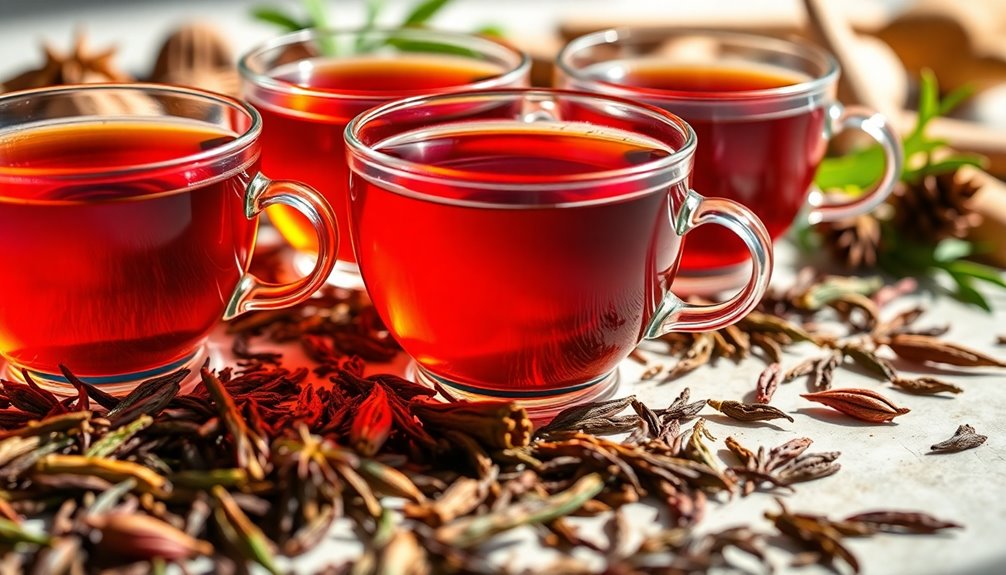
Rooibos tea offers two main variants that cater to different taste preferences and health benefits.
Red rooibos is fully oxidized, resulting in a rich flavor, while green rooibos is minimally oxidized, providing a lighter taste and higher antioxidant levels.
You can also explore flavored rooibos options, which blend this herbal tea with fruits, spices, or other herbs for diverse tea blends.
Whether you prefer loose leaf, tea bags, or powdered versions, there's a style for everyone.
The grading of rooibos affects your experience, as higher leaf content leads to a darker liquor and richer flavor.
Specialty tea shops and health food stores increasingly offer these variants, meeting the growing demand for unique herbal teas.
Health Benefits and Nutritional Profile
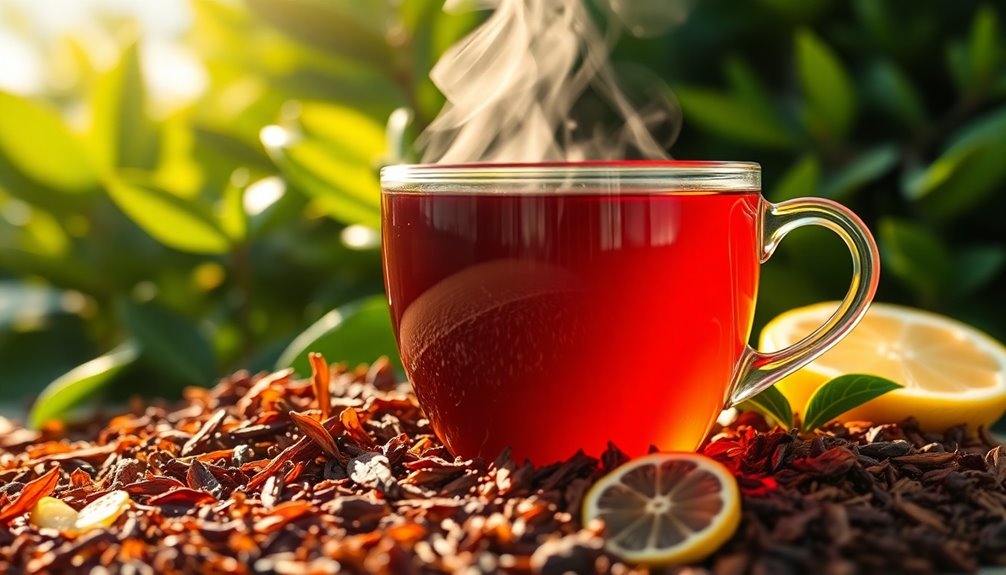
While many herbal teas offer health benefits, rooibos stands out due to its unique nutritional profile and rich array of antioxidants. This red bush tea is naturally caffeine-free, making it perfect for any time of day.
Here are some key benefits you'll enjoy:
- Rich in Antioxidants: Aspalathin and quercetin protect against free radical damage.
- Heart Health: Rooibos may improve cholesterol levels and lower blood pressure, aiding cardiovascular wellness.
- Low Tannin Levels: It doesn't interfere with nutrient absorption, particularly iron.
- Nutritional Support: Packed with calcium, magnesium, and zinc, it promotes better bone health and reduces inflammation.
Incorporating rooibos into your daily routine can provide significant health advantages.
Production and Processing Insights
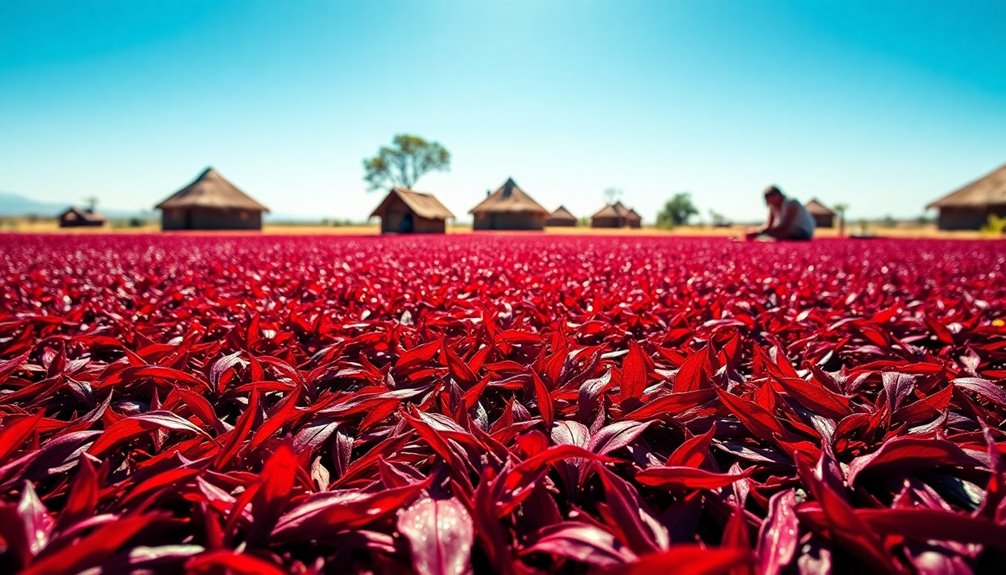
Understanding the health benefits of rooibos sets the stage for appreciating its production and processing. Rooibos is primarily cultivated in the Cederberg region of South Africa, where the climate and soil create ideal growing conditions.
The production process involves hand-harvesting the leaves, which are then bruised to promote oxidation. This step gives the fully oxidized red rooibos its characteristic reddish-brown color. Alternatively, green rooibos undergoes minimal oxidation, resulting in a lighter flavor and higher antioxidants.
Grading is based on the leaf-to-stem ratio, affecting the liquor's darkness and richness. Annually, around 15,000 tons of rooibos are produced, with approximately 7,000 tons exported to markets like Germany, the Netherlands, and the United States, showcasing its global appeal.
Frequently Asked Questions
What Does Rooibos Translate To?
When you ask what rooibos translates to, you're looking at its Afrikaans roots.
The word "rooibos" comes from "rooibosch," which means "red bush." The term perfectly describes the reddish hue of the leaves from the Aspalathus linearis plant.
In Afrikaans, "rooi" means "red," while "bos" refers to a bush or shrub.
This translation highlights the plant's visual characteristics and its significance in South African tea culture.
What Is the Disadvantage of Rooibos?
When considering rooibos, you should be aware of a few disadvantages. It can be pricier than other herbal teas due to its complex production.
You might also experience mild digestive issues if you consume it excessively. There's limited research on its long-term effects, so if you're a heavy user or take certain medications, consulting a healthcare provider is a smart move.
Finally, allergies to leguminous plants could pose a risk for some.
What Is Rooibos Tea Called in America?
Imagine walking through a vibrant market, the aroma of exotic spices filling the air.
In America, you'll find rooibos tea often labeled simply as "rooibos" or "red tea." It's a popular choice among health-conscious drinkers seeking a caffeine-free alternative. You might even spot flavored varieties like vanilla or chai, tempting your taste buds.
This herbal delight has made its mark in specialty shops, reflecting a growing appreciation for wellness and relaxation.
What Does Rooibos Do Spiritually?
When you drink rooibos tea, you're inviting a sense of tranquility into your life.
Its calming properties can enhance your meditation and mindfulness practices, helping you connect more deeply with yourself.
You might find that rooibos supports your emotional well-being, fostering a positive mindset.
As you sip, you're not just enjoying a flavorful beverage; you're engaging in a mindful ritual that promotes grounding and presence in your spiritual journey.
Conclusion
In exploring rooibos, you uncover a rich tapestry of culture and health benefits, much like discovering a hidden gem in a bustling market. You might sip a warm cup, feeling the sun of South Africa on your skin, while the sweet aroma transports you to lush fields. Just as the vibrant red leaves steep into a soothing brew, you find that rooibos isn't just tea; it's a connection to tradition, wellness, and the simple joys of life.





